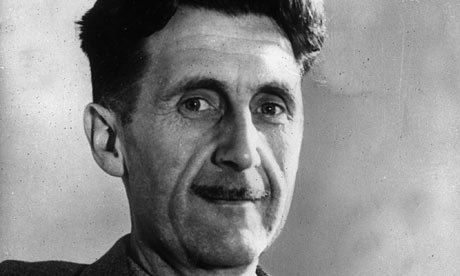



"It was a bright cold day in April, and the clocks were striking thirteen."
Sixty years after the publication of Orwell's masterpiece, Nineteen Eighty-Four, that crystal first line sounds as natural and compelling as ever. But when you see the original manuscript, you find something else: not so much the ringing clarity, more the obsessive rewriting, in different inks, that betrays the extraordinary turmoil behind its composition.
Probably the definitive novel of the 20th century, a story that remains eternally fresh and contemporary, and whose terms such as "Big Brother", "doublethink" and "newspeak" have become part of everyday currency, Nineteen Eighty-Four has been translated into more than 65 languages and sold millions of copies worldwide, giving George Orwell a unique place in world literature.
"Orwellian" is now a universal shorthand for anything repressive or totalitarian, and the story of Winston Smith, an everyman for his times, continues to resonate for readers whose fears for the future are very different from those of an English writer in the mid-1940s.
The circumstances surrounding the writing of Nineteen Eighty-Four make a haunting narrative that helps to explain the bleakness of Orwell's dystopia. Here was an English writer, desperately sick, grappling alone with the demons of his imagination in a bleak Scottish outpost in the desolate aftermath of the second world war. The idea for Nineteen Eighty-Four, alternatively, "The Last Man in Europe", had been incubating in Orwell's mind since the Spanish civil war. His novel, which owes something to Yevgeny Zamyatin's dystopian fiction We, probably began to acquire a definitive shape during 1943-44, around the time he and his wife, Eileen adopted their only son, Richard. Orwell himself claimed that he was partly inspired by the meeting of the Allied leaders at the Tehran Conference of 1944. Isaac Deutscher, an Observer colleague, reported that Orwell was "convinced that Stalin, Churchill and Roosevelt consciously plotted to divide the world" at Tehran.
Orwell had worked for David Astor's Observer since 1942, first as a book reviewer and later as a correspondent. The editor professed great admiration for Orwell's "absolute straightforwardness, his honesty and his decency", and would be his patron throughout the 1940s. The closeness of their friendship is crucial to the story of Nineteen Eighty-Four.
Tags:
Corresponding posting:
And yes, that's David Astor of the Astor Family. Here's the Wiki link and excerpt:
http://en.wikipedia.org/wiki/David_Astor
Francis David Langhorne Astor CH (March 5, 1912 – December 7, 2001) was an English newspaper publisher and member of the Astor family.
"Destroying the New World Order"
THANK YOU FOR SUPPORTING THE SITE!
© 2026 Created by truth.
Powered by
![]()